SOE09403 Operations Management Report: Rolls-Royce and Brexit Impacts
VerifiedAdded on 2023/01/18
|28
|7065
|77
Report
AI Summary
This report analyzes the operations management challenges faced by Rolls-Royce Motor Cars in the context of the global automotive industry. The study focuses on the implications of Brexit, quality control, and environmental factors, and their impact on Rolls-Royce's competitive performance. It examines key issues such as labor shortages, import/export tariffs, and economic instability stemming from Brexit, alongside quality management concerns and the increasing pressure to reduce environmental impact. The report investigates the adoption of lean practices, like those implemented by Toyota, and the implementation of green business strategies. It also recommends strategies for Rolls-Royce to mitigate these challenges, improve its operational efficiency, and reduce its environmental footprint. The report also looks at the implications of setting up operations and supply chains in BRICS countries. The report concludes by providing actionable recommendations for Rolls-Royce to navigate the evolving landscape of the automotive industry.
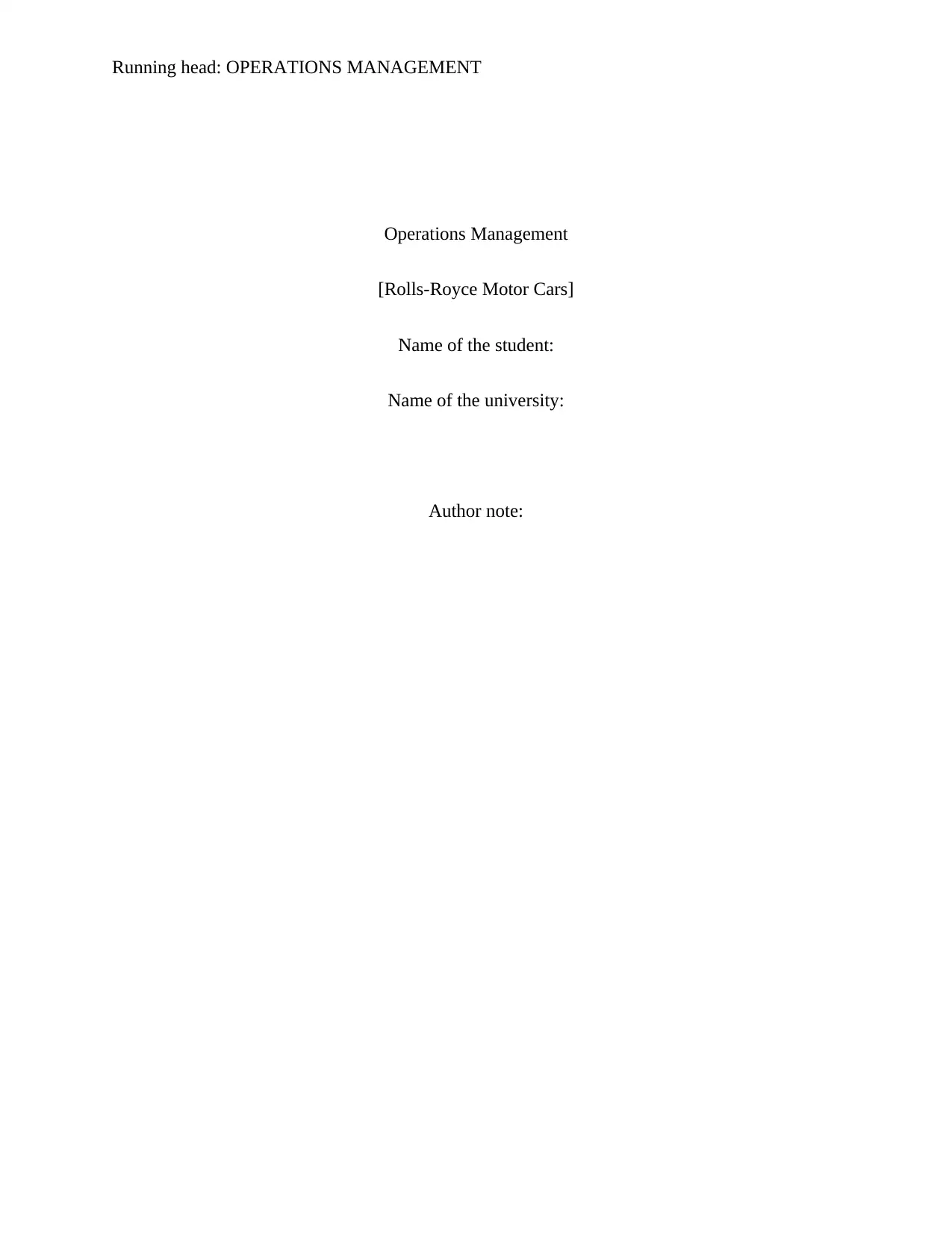
Running head: OPERATIONS MANAGEMENT
Operations Management
[Rolls-Royce Motor Cars]
Name of the student:
Name of the university:
Author note:
Operations Management
[Rolls-Royce Motor Cars]
Name of the student:
Name of the university:
Author note:
Paraphrase This Document
Need a fresh take? Get an instant paraphrase of this document with our AI Paraphraser
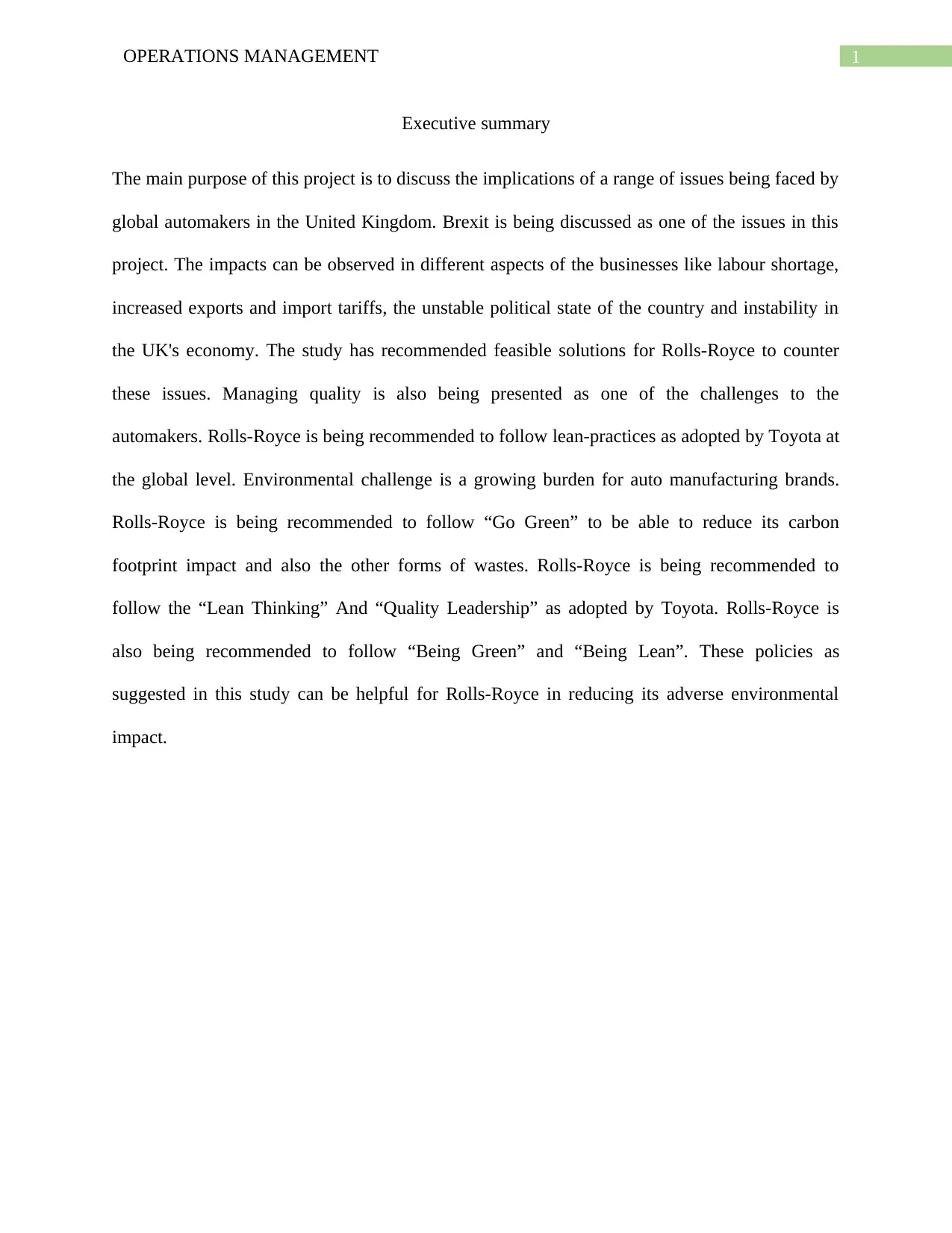
1OPERATIONS MANAGEMENT
Executive summary
The main purpose of this project is to discuss the implications of a range of issues being faced by
global automakers in the United Kingdom. Brexit is being discussed as one of the issues in this
project. The impacts can be observed in different aspects of the businesses like labour shortage,
increased exports and import tariffs, the unstable political state of the country and instability in
the UK's economy. The study has recommended feasible solutions for Rolls-Royce to counter
these issues. Managing quality is also being presented as one of the challenges to the
automakers. Rolls-Royce is being recommended to follow lean-practices as adopted by Toyota at
the global level. Environmental challenge is a growing burden for auto manufacturing brands.
Rolls-Royce is being recommended to follow “Go Green” to be able to reduce its carbon
footprint impact and also the other forms of wastes. Rolls-Royce is being recommended to
follow the “Lean Thinking” And “Quality Leadership” as adopted by Toyota. Rolls-Royce is
also being recommended to follow “Being Green” and “Being Lean”. These policies as
suggested in this study can be helpful for Rolls-Royce in reducing its adverse environmental
impact.
Executive summary
The main purpose of this project is to discuss the implications of a range of issues being faced by
global automakers in the United Kingdom. Brexit is being discussed as one of the issues in this
project. The impacts can be observed in different aspects of the businesses like labour shortage,
increased exports and import tariffs, the unstable political state of the country and instability in
the UK's economy. The study has recommended feasible solutions for Rolls-Royce to counter
these issues. Managing quality is also being presented as one of the challenges to the
automakers. Rolls-Royce is being recommended to follow lean-practices as adopted by Toyota at
the global level. Environmental challenge is a growing burden for auto manufacturing brands.
Rolls-Royce is being recommended to follow “Go Green” to be able to reduce its carbon
footprint impact and also the other forms of wastes. Rolls-Royce is being recommended to
follow the “Lean Thinking” And “Quality Leadership” as adopted by Toyota. Rolls-Royce is
also being recommended to follow “Being Green” and “Being Lean”. These policies as
suggested in this study can be helpful for Rolls-Royce in reducing its adverse environmental
impact.
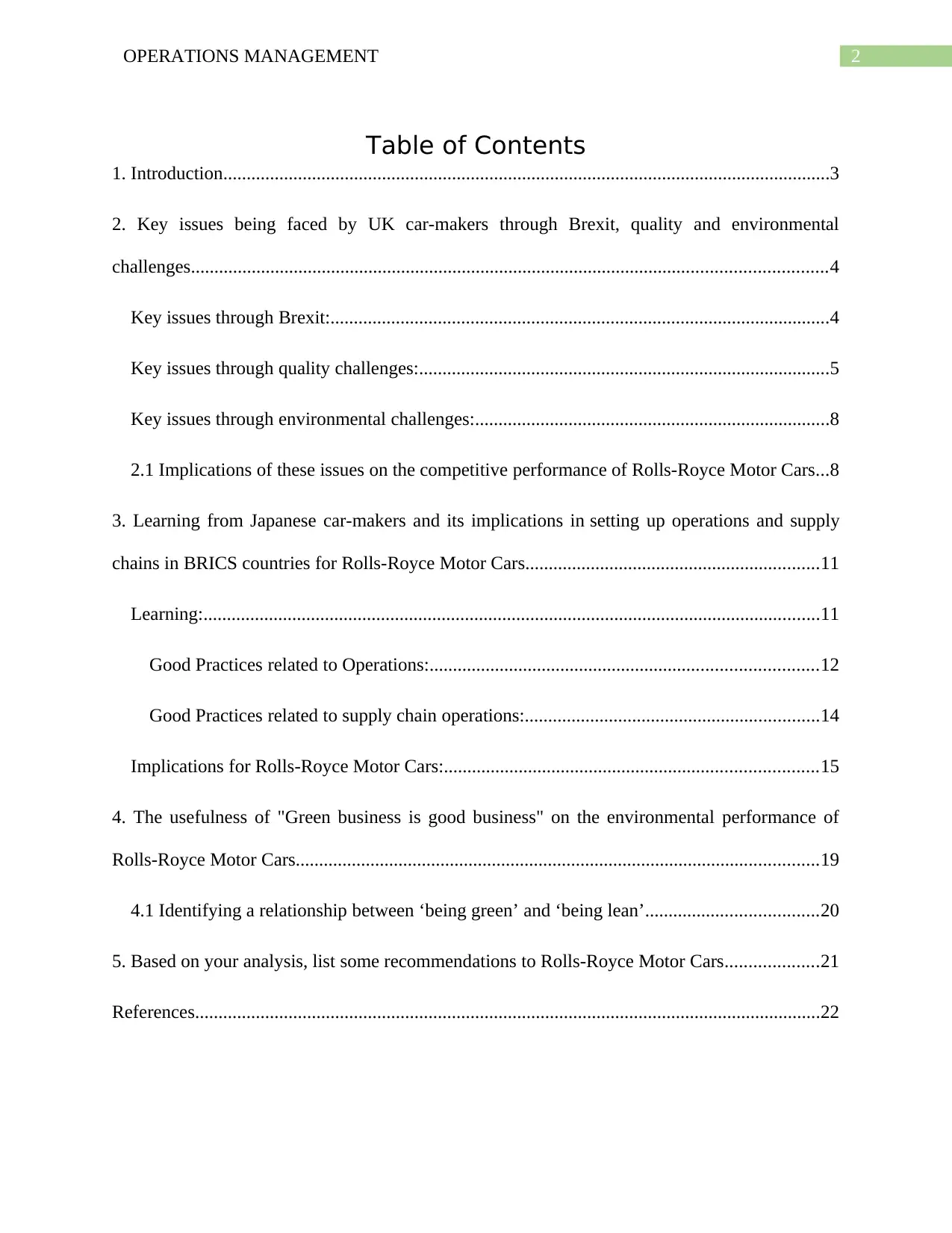
2OPERATIONS MANAGEMENT
Table of Contents
1. Introduction..................................................................................................................................3
2. Key issues being faced by UK car-makers through Brexit, quality and environmental
challenges........................................................................................................................................4
Key issues through Brexit:...........................................................................................................4
Key issues through quality challenges:........................................................................................5
Key issues through environmental challenges:............................................................................8
2.1 Implications of these issues on the competitive performance of Rolls-Royce Motor Cars...8
3. Learning from Japanese car-makers and its implications in setting up operations and supply
chains in BRICS countries for Rolls-Royce Motor Cars...............................................................11
Learning:....................................................................................................................................11
Good Practices related to Operations:...................................................................................12
Good Practices related to supply chain operations:...............................................................14
Implications for Rolls-Royce Motor Cars:................................................................................15
4. The usefulness of "Green business is good business" on the environmental performance of
Rolls-Royce Motor Cars................................................................................................................19
4.1 Identifying a relationship between ‘being green’ and ‘being lean’.....................................20
5. Based on your analysis, list some recommendations to Rolls-Royce Motor Cars....................21
References......................................................................................................................................22
Table of Contents
1. Introduction..................................................................................................................................3
2. Key issues being faced by UK car-makers through Brexit, quality and environmental
challenges........................................................................................................................................4
Key issues through Brexit:...........................................................................................................4
Key issues through quality challenges:........................................................................................5
Key issues through environmental challenges:............................................................................8
2.1 Implications of these issues on the competitive performance of Rolls-Royce Motor Cars...8
3. Learning from Japanese car-makers and its implications in setting up operations and supply
chains in BRICS countries for Rolls-Royce Motor Cars...............................................................11
Learning:....................................................................................................................................11
Good Practices related to Operations:...................................................................................12
Good Practices related to supply chain operations:...............................................................14
Implications for Rolls-Royce Motor Cars:................................................................................15
4. The usefulness of "Green business is good business" on the environmental performance of
Rolls-Royce Motor Cars................................................................................................................19
4.1 Identifying a relationship between ‘being green’ and ‘being lean’.....................................20
5. Based on your analysis, list some recommendations to Rolls-Royce Motor Cars....................21
References......................................................................................................................................22
⊘ This is a preview!⊘
Do you want full access?
Subscribe today to unlock all pages.

Trusted by 1+ million students worldwide

3OPERATIONS MANAGEMENT
Paraphrase This Document
Need a fresh take? Get an instant paraphrase of this document with our AI Paraphraser
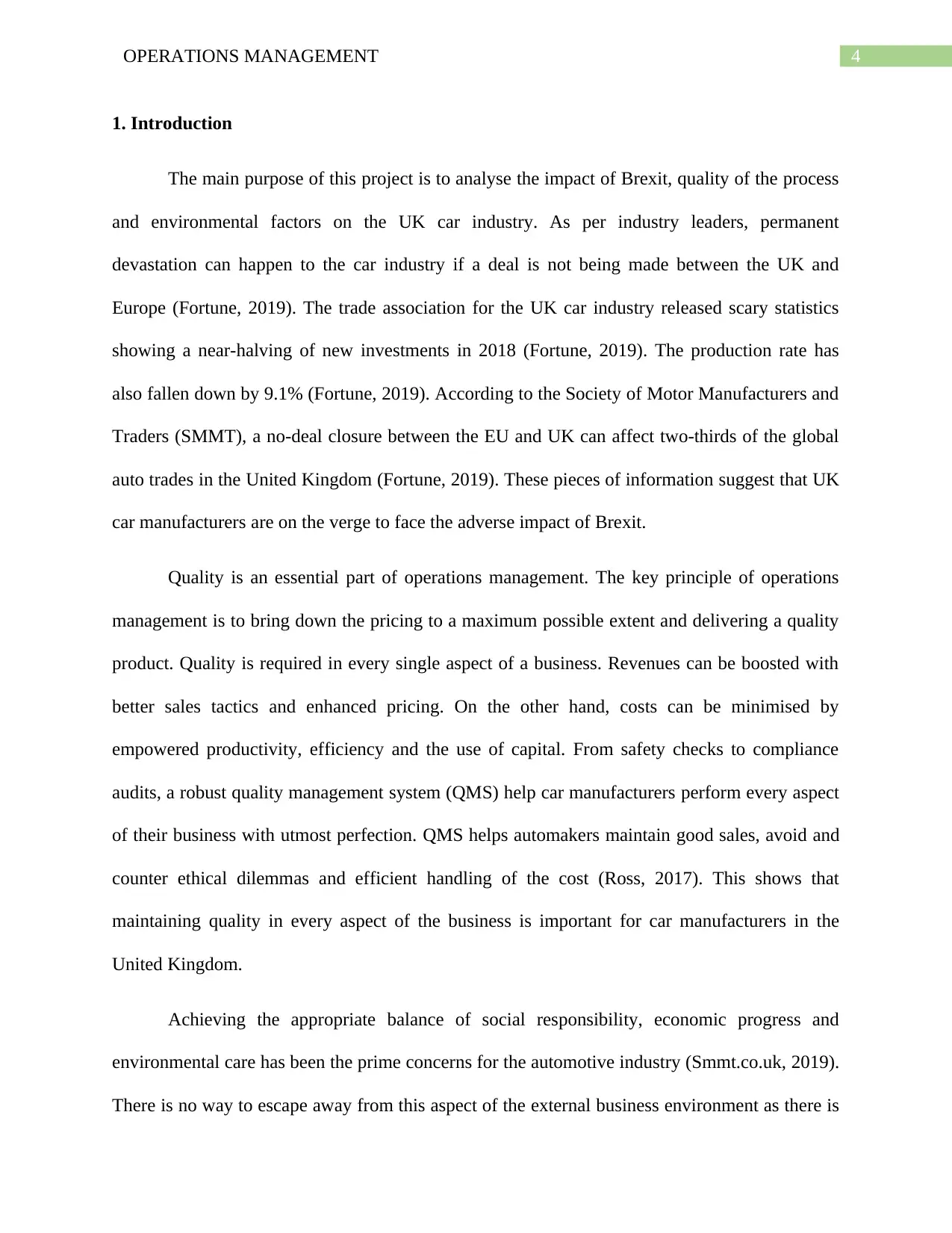
4OPERATIONS MANAGEMENT
1. Introduction
The main purpose of this project is to analyse the impact of Brexit, quality of the process
and environmental factors on the UK car industry. As per industry leaders, permanent
devastation can happen to the car industry if a deal is not being made between the UK and
Europe (Fortune, 2019). The trade association for the UK car industry released scary statistics
showing a near-halving of new investments in 2018 (Fortune, 2019). The production rate has
also fallen down by 9.1% (Fortune, 2019). According to the Society of Motor Manufacturers and
Traders (SMMT), a no-deal closure between the EU and UK can affect two-thirds of the global
auto trades in the United Kingdom (Fortune, 2019). These pieces of information suggest that UK
car manufacturers are on the verge to face the adverse impact of Brexit.
Quality is an essential part of operations management. The key principle of operations
management is to bring down the pricing to a maximum possible extent and delivering a quality
product. Quality is required in every single aspect of a business. Revenues can be boosted with
better sales tactics and enhanced pricing. On the other hand, costs can be minimised by
empowered productivity, efficiency and the use of capital. From safety checks to compliance
audits, a robust quality management system (QMS) help car manufacturers perform every aspect
of their business with utmost perfection. QMS helps automakers maintain good sales, avoid and
counter ethical dilemmas and efficient handling of the cost (Ross, 2017). This shows that
maintaining quality in every aspect of the business is important for car manufacturers in the
United Kingdom.
Achieving the appropriate balance of social responsibility, economic progress and
environmental care has been the prime concerns for the automotive industry (Smmt.co.uk, 2019).
There is no way to escape away from this aspect of the external business environment as there is
1. Introduction
The main purpose of this project is to analyse the impact of Brexit, quality of the process
and environmental factors on the UK car industry. As per industry leaders, permanent
devastation can happen to the car industry if a deal is not being made between the UK and
Europe (Fortune, 2019). The trade association for the UK car industry released scary statistics
showing a near-halving of new investments in 2018 (Fortune, 2019). The production rate has
also fallen down by 9.1% (Fortune, 2019). According to the Society of Motor Manufacturers and
Traders (SMMT), a no-deal closure between the EU and UK can affect two-thirds of the global
auto trades in the United Kingdom (Fortune, 2019). These pieces of information suggest that UK
car manufacturers are on the verge to face the adverse impact of Brexit.
Quality is an essential part of operations management. The key principle of operations
management is to bring down the pricing to a maximum possible extent and delivering a quality
product. Quality is required in every single aspect of a business. Revenues can be boosted with
better sales tactics and enhanced pricing. On the other hand, costs can be minimised by
empowered productivity, efficiency and the use of capital. From safety checks to compliance
audits, a robust quality management system (QMS) help car manufacturers perform every aspect
of their business with utmost perfection. QMS helps automakers maintain good sales, avoid and
counter ethical dilemmas and efficient handling of the cost (Ross, 2017). This shows that
maintaining quality in every aspect of the business is important for car manufacturers in the
United Kingdom.
Achieving the appropriate balance of social responsibility, economic progress and
environmental care has been the prime concerns for the automotive industry (Smmt.co.uk, 2019).
There is no way to escape away from this aspect of the external business environment as there is
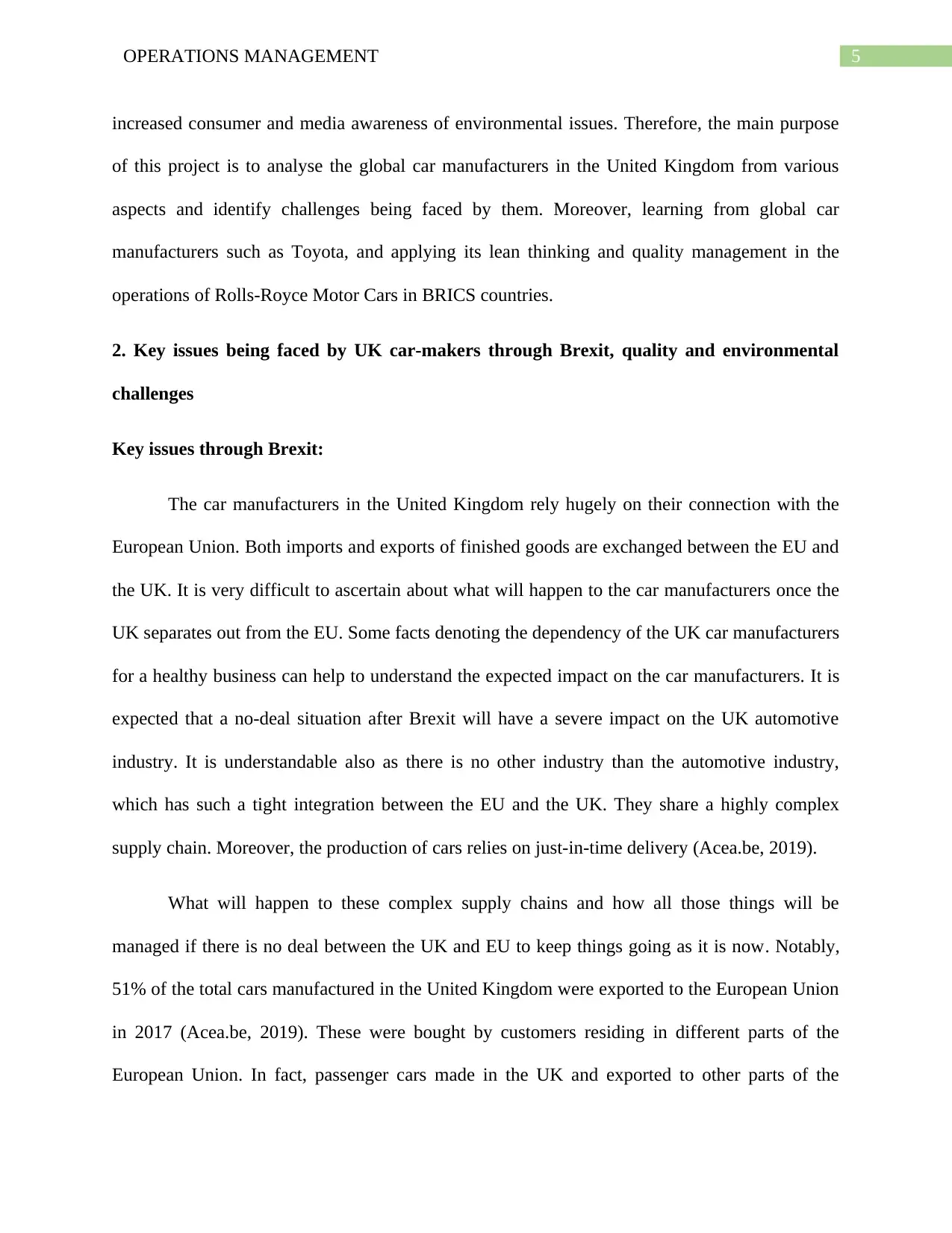
5OPERATIONS MANAGEMENT
increased consumer and media awareness of environmental issues. Therefore, the main purpose
of this project is to analyse the global car manufacturers in the United Kingdom from various
aspects and identify challenges being faced by them. Moreover, learning from global car
manufacturers such as Toyota, and applying its lean thinking and quality management in the
operations of Rolls-Royce Motor Cars in BRICS countries.
2. Key issues being faced by UK car-makers through Brexit, quality and environmental
challenges
Key issues through Brexit:
The car manufacturers in the United Kingdom rely hugely on their connection with the
European Union. Both imports and exports of finished goods are exchanged between the EU and
the UK. It is very difficult to ascertain about what will happen to the car manufacturers once the
UK separates out from the EU. Some facts denoting the dependency of the UK car manufacturers
for a healthy business can help to understand the expected impact on the car manufacturers. It is
expected that a no-deal situation after Brexit will have a severe impact on the UK automotive
industry. It is understandable also as there is no other industry than the automotive industry,
which has such a tight integration between the EU and the UK. They share a highly complex
supply chain. Moreover, the production of cars relies on just-in-time delivery (Acea.be, 2019).
What will happen to these complex supply chains and how all those things will be
managed if there is no deal between the UK and EU to keep things going as it is now. Notably,
51% of the total cars manufactured in the United Kingdom were exported to the European Union
in 2017 (Acea.be, 2019). These were bought by customers residing in different parts of the
European Union. In fact, passenger cars made in the UK and exported to other parts of the
increased consumer and media awareness of environmental issues. Therefore, the main purpose
of this project is to analyse the global car manufacturers in the United Kingdom from various
aspects and identify challenges being faced by them. Moreover, learning from global car
manufacturers such as Toyota, and applying its lean thinking and quality management in the
operations of Rolls-Royce Motor Cars in BRICS countries.
2. Key issues being faced by UK car-makers through Brexit, quality and environmental
challenges
Key issues through Brexit:
The car manufacturers in the United Kingdom rely hugely on their connection with the
European Union. Both imports and exports of finished goods are exchanged between the EU and
the UK. It is very difficult to ascertain about what will happen to the car manufacturers once the
UK separates out from the EU. Some facts denoting the dependency of the UK car manufacturers
for a healthy business can help to understand the expected impact on the car manufacturers. It is
expected that a no-deal situation after Brexit will have a severe impact on the UK automotive
industry. It is understandable also as there is no other industry than the automotive industry,
which has such a tight integration between the EU and the UK. They share a highly complex
supply chain. Moreover, the production of cars relies on just-in-time delivery (Acea.be, 2019).
What will happen to these complex supply chains and how all those things will be
managed if there is no deal between the UK and EU to keep things going as it is now. Notably,
51% of the total cars manufactured in the United Kingdom were exported to the European Union
in 2017 (Acea.be, 2019). These were bought by customers residing in different parts of the
European Union. In fact, passenger cars made in the UK and exported to other parts of the
⊘ This is a preview!⊘
Do you want full access?
Subscribe today to unlock all pages.

Trusted by 1+ million students worldwide
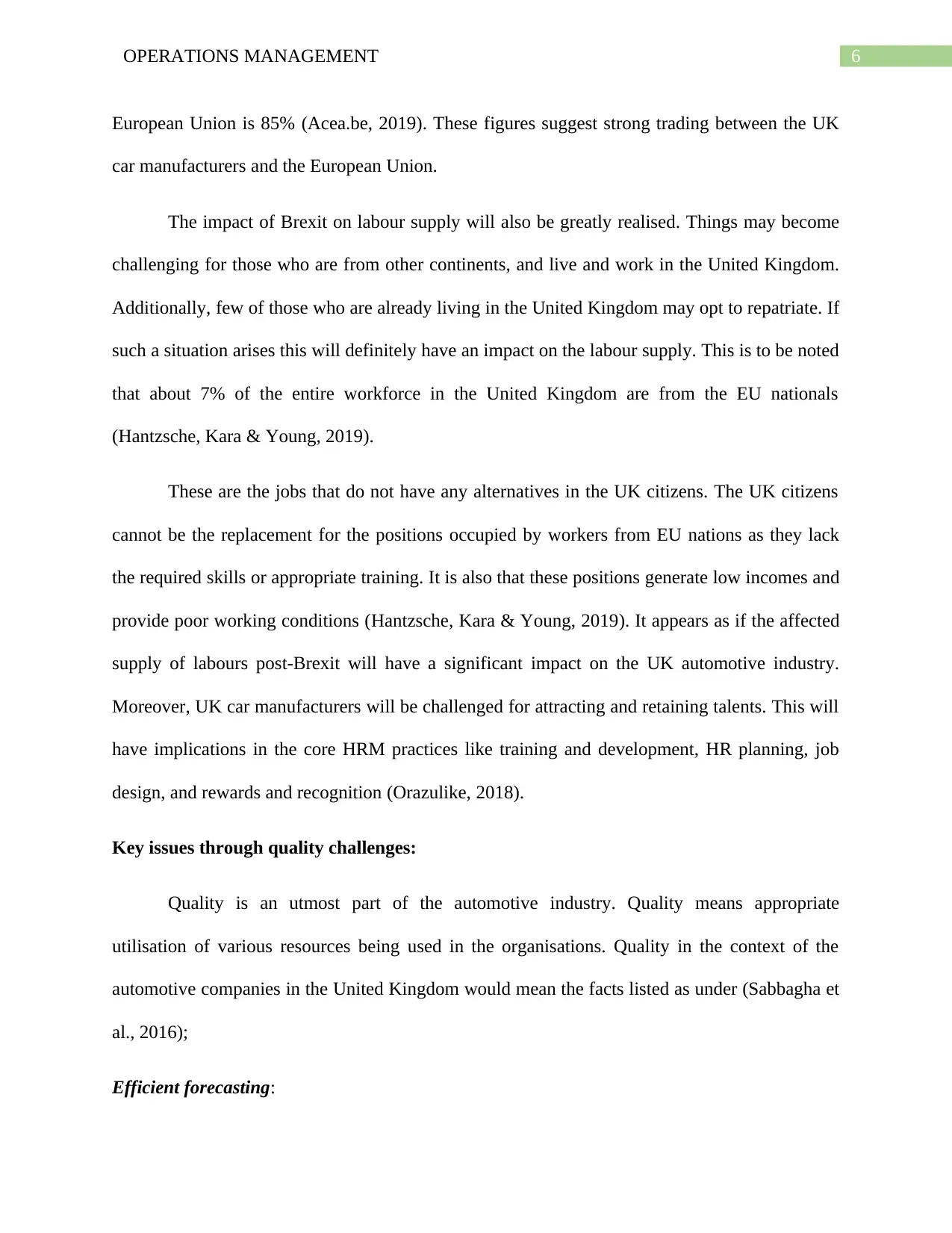
6OPERATIONS MANAGEMENT
European Union is 85% (Acea.be, 2019). These figures suggest strong trading between the UK
car manufacturers and the European Union.
The impact of Brexit on labour supply will also be greatly realised. Things may become
challenging for those who are from other continents, and live and work in the United Kingdom.
Additionally, few of those who are already living in the United Kingdom may opt to repatriate. If
such a situation arises this will definitely have an impact on the labour supply. This is to be noted
that about 7% of the entire workforce in the United Kingdom are from the EU nationals
(Hantzsche, Kara & Young, 2019).
These are the jobs that do not have any alternatives in the UK citizens. The UK citizens
cannot be the replacement for the positions occupied by workers from EU nations as they lack
the required skills or appropriate training. It is also that these positions generate low incomes and
provide poor working conditions (Hantzsche, Kara & Young, 2019). It appears as if the affected
supply of labours post-Brexit will have a significant impact on the UK automotive industry.
Moreover, UK car manufacturers will be challenged for attracting and retaining talents. This will
have implications in the core HRM practices like training and development, HR planning, job
design, and rewards and recognition (Orazulike, 2018).
Key issues through quality challenges:
Quality is an utmost part of the automotive industry. Quality means appropriate
utilisation of various resources being used in the organisations. Quality in the context of the
automotive companies in the United Kingdom would mean the facts listed as under (Sabbagha et
al., 2016);
Efficient forecasting:
European Union is 85% (Acea.be, 2019). These figures suggest strong trading between the UK
car manufacturers and the European Union.
The impact of Brexit on labour supply will also be greatly realised. Things may become
challenging for those who are from other continents, and live and work in the United Kingdom.
Additionally, few of those who are already living in the United Kingdom may opt to repatriate. If
such a situation arises this will definitely have an impact on the labour supply. This is to be noted
that about 7% of the entire workforce in the United Kingdom are from the EU nationals
(Hantzsche, Kara & Young, 2019).
These are the jobs that do not have any alternatives in the UK citizens. The UK citizens
cannot be the replacement for the positions occupied by workers from EU nations as they lack
the required skills or appropriate training. It is also that these positions generate low incomes and
provide poor working conditions (Hantzsche, Kara & Young, 2019). It appears as if the affected
supply of labours post-Brexit will have a significant impact on the UK automotive industry.
Moreover, UK car manufacturers will be challenged for attracting and retaining talents. This will
have implications in the core HRM practices like training and development, HR planning, job
design, and rewards and recognition (Orazulike, 2018).
Key issues through quality challenges:
Quality is an utmost part of the automotive industry. Quality means appropriate
utilisation of various resources being used in the organisations. Quality in the context of the
automotive companies in the United Kingdom would mean the facts listed as under (Sabbagha et
al., 2016);
Efficient forecasting:
Paraphrase This Document
Need a fresh take? Get an instant paraphrase of this document with our AI Paraphraser
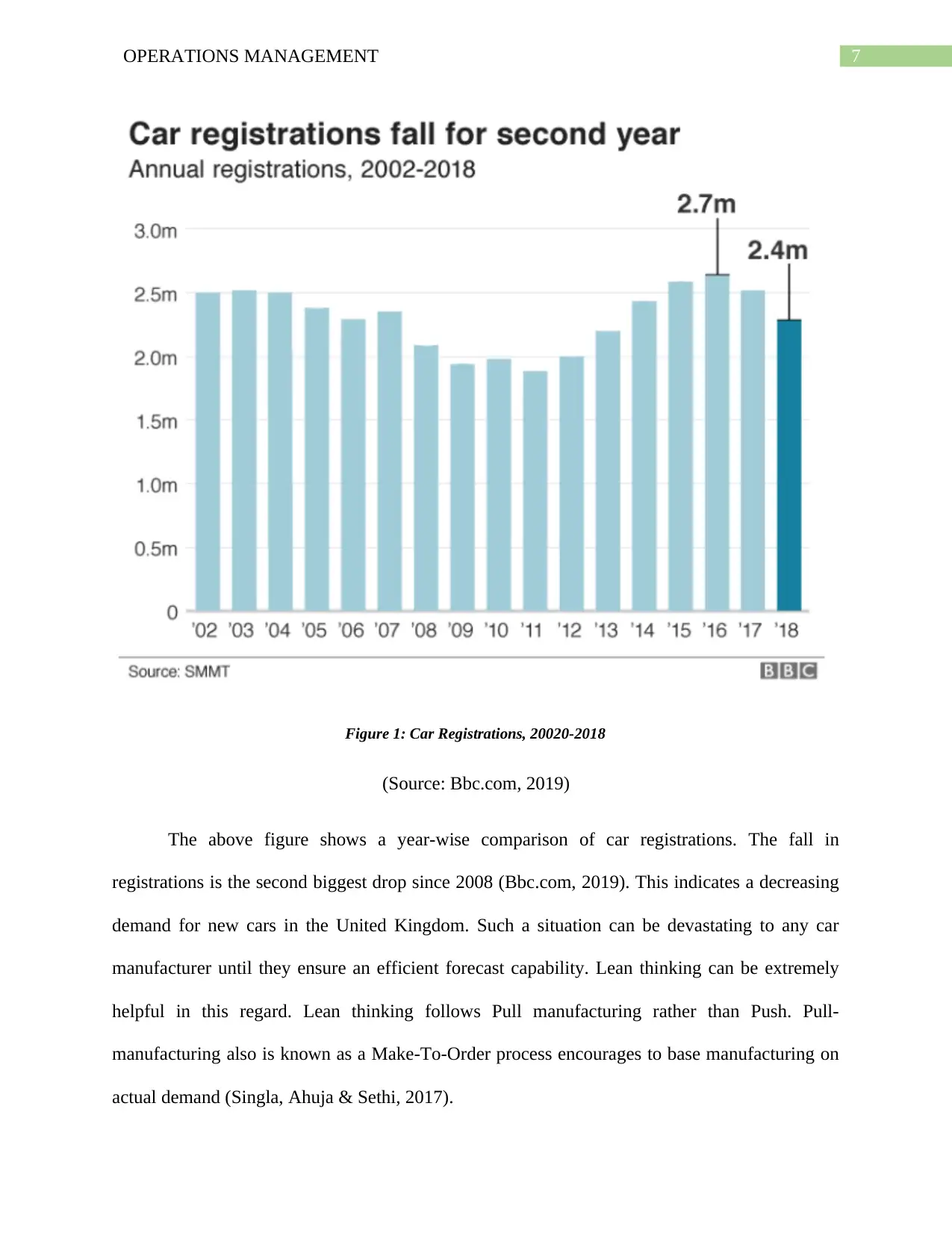
7OPERATIONS MANAGEMENT
Figure 1: Car Registrations, 20020-2018
(Source: Bbc.com, 2019)
The above figure shows a year-wise comparison of car registrations. The fall in
registrations is the second biggest drop since 2008 (Bbc.com, 2019). This indicates a decreasing
demand for new cars in the United Kingdom. Such a situation can be devastating to any car
manufacturer until they ensure an efficient forecast capability. Lean thinking can be extremely
helpful in this regard. Lean thinking follows Pull manufacturing rather than Push. Pull-
manufacturing also is known as a Make-To-Order process encourages to base manufacturing on
actual demand (Singla, Ahuja & Sethi, 2017).
Figure 1: Car Registrations, 20020-2018
(Source: Bbc.com, 2019)
The above figure shows a year-wise comparison of car registrations. The fall in
registrations is the second biggest drop since 2008 (Bbc.com, 2019). This indicates a decreasing
demand for new cars in the United Kingdom. Such a situation can be devastating to any car
manufacturer until they ensure an efficient forecast capability. Lean thinking can be extremely
helpful in this regard. Lean thinking follows Pull manufacturing rather than Push. Pull-
manufacturing also is known as a Make-To-Order process encourages to base manufacturing on
actual demand (Singla, Ahuja & Sethi, 2017).
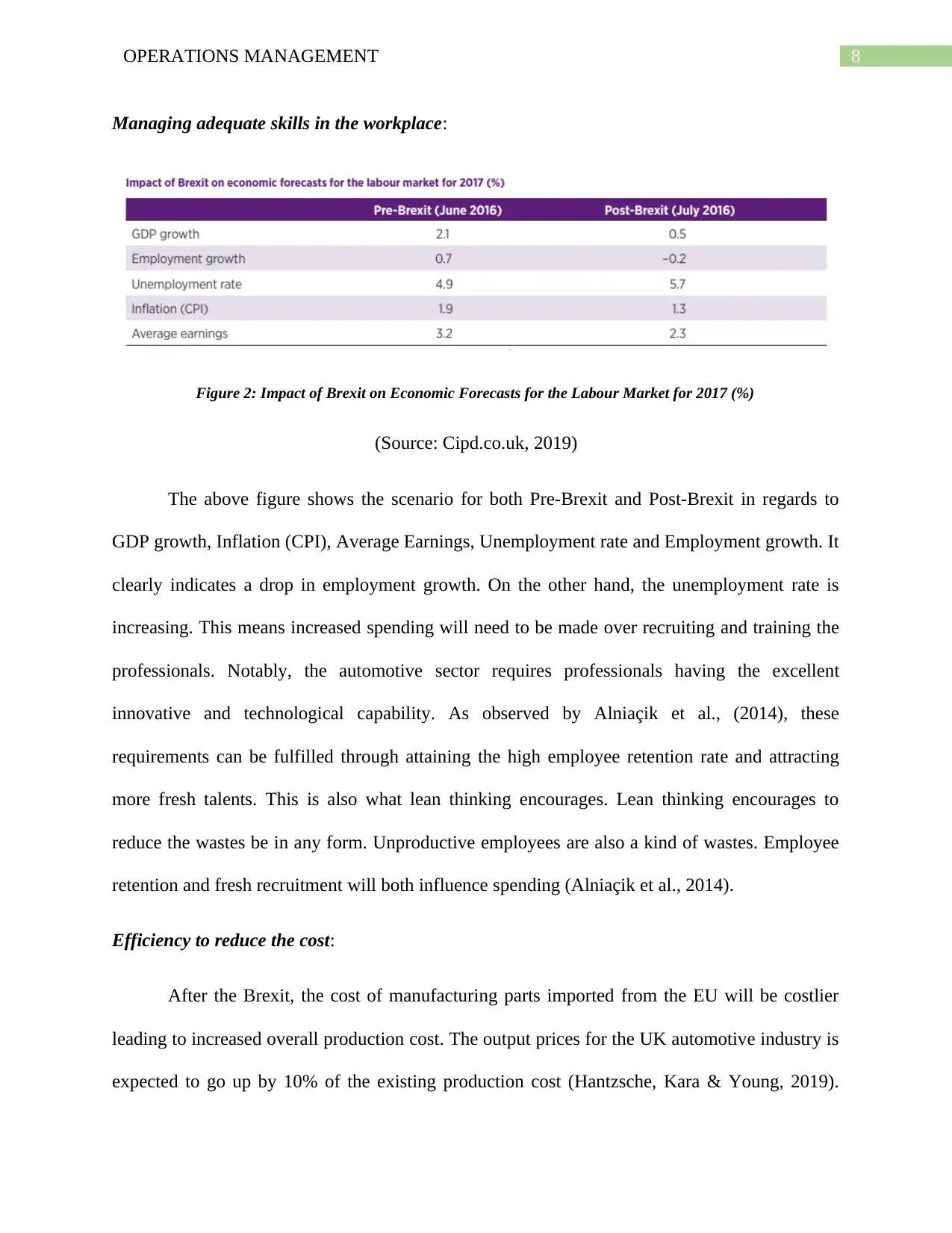
8OPERATIONS MANAGEMENT
Managing adequate skills in the workplace:
Figure 2: Impact of Brexit on Economic Forecasts for the Labour Market for 2017 (%)
(Source: Cipd.co.uk, 2019)
The above figure shows the scenario for both Pre-Brexit and Post-Brexit in regards to
GDP growth, Inflation (CPI), Average Earnings, Unemployment rate and Employment growth. It
clearly indicates a drop in employment growth. On the other hand, the unemployment rate is
increasing. This means increased spending will need to be made over recruiting and training the
professionals. Notably, the automotive sector requires professionals having the excellent
innovative and technological capability. As observed by Alniaçik et al., (2014), these
requirements can be fulfilled through attaining the high employee retention rate and attracting
more fresh talents. This is also what lean thinking encourages. Lean thinking encourages to
reduce the wastes be in any form. Unproductive employees are also a kind of wastes. Employee
retention and fresh recruitment will both influence spending (Alniaçik et al., 2014).
Efficiency to reduce the cost:
After the Brexit, the cost of manufacturing parts imported from the EU will be costlier
leading to increased overall production cost. The output prices for the UK automotive industry is
expected to go up by 10% of the existing production cost (Hantzsche, Kara & Young, 2019).
Managing adequate skills in the workplace:
Figure 2: Impact of Brexit on Economic Forecasts for the Labour Market for 2017 (%)
(Source: Cipd.co.uk, 2019)
The above figure shows the scenario for both Pre-Brexit and Post-Brexit in regards to
GDP growth, Inflation (CPI), Average Earnings, Unemployment rate and Employment growth. It
clearly indicates a drop in employment growth. On the other hand, the unemployment rate is
increasing. This means increased spending will need to be made over recruiting and training the
professionals. Notably, the automotive sector requires professionals having the excellent
innovative and technological capability. As observed by Alniaçik et al., (2014), these
requirements can be fulfilled through attaining the high employee retention rate and attracting
more fresh talents. This is also what lean thinking encourages. Lean thinking encourages to
reduce the wastes be in any form. Unproductive employees are also a kind of wastes. Employee
retention and fresh recruitment will both influence spending (Alniaçik et al., 2014).
Efficiency to reduce the cost:
After the Brexit, the cost of manufacturing parts imported from the EU will be costlier
leading to increased overall production cost. The output prices for the UK automotive industry is
expected to go up by 10% of the existing production cost (Hantzsche, Kara & Young, 2019).
⊘ This is a preview!⊘
Do you want full access?
Subscribe today to unlock all pages.

Trusted by 1+ million students worldwide
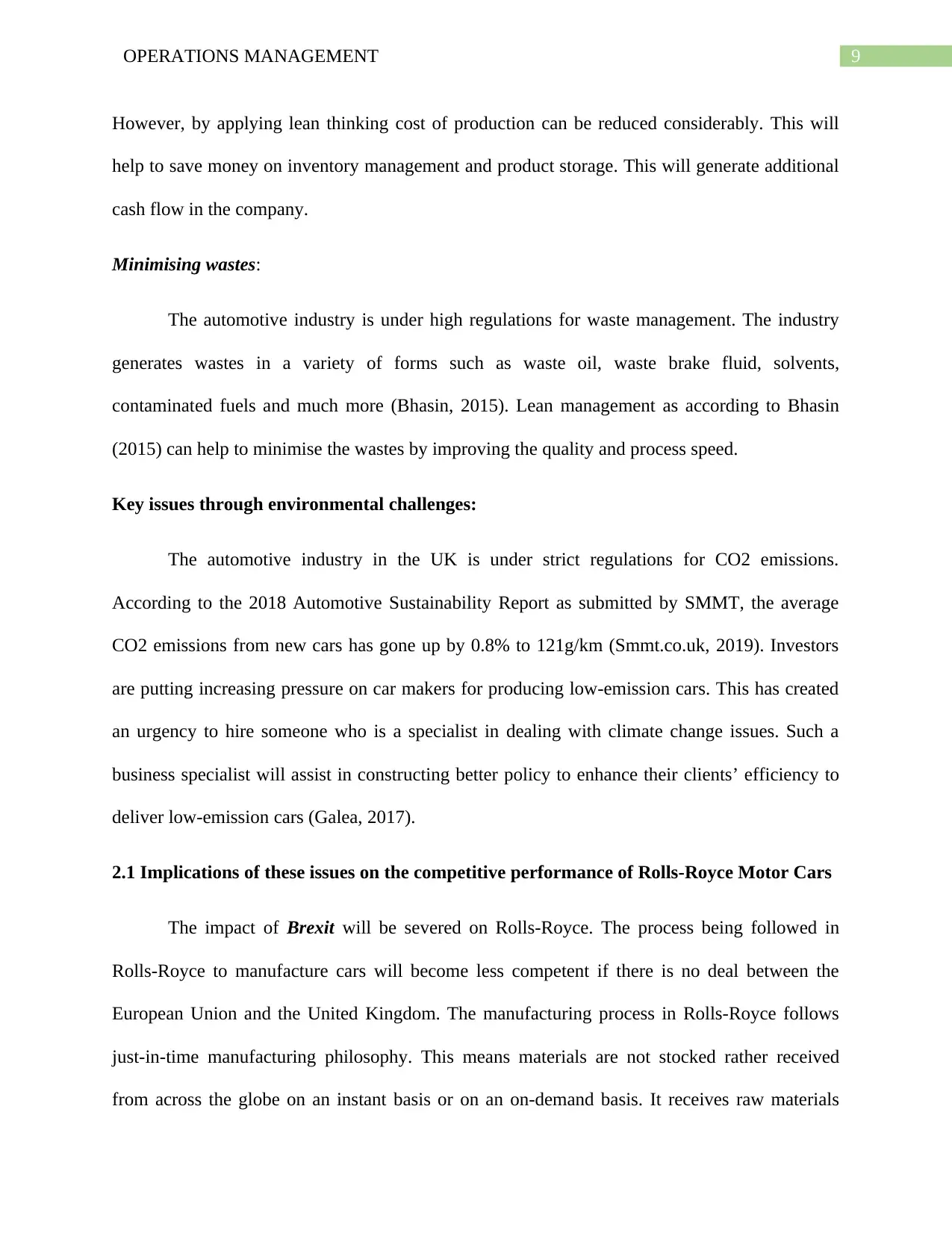
9OPERATIONS MANAGEMENT
However, by applying lean thinking cost of production can be reduced considerably. This will
help to save money on inventory management and product storage. This will generate additional
cash flow in the company.
Minimising wastes:
The automotive industry is under high regulations for waste management. The industry
generates wastes in a variety of forms such as waste oil, waste brake fluid, solvents,
contaminated fuels and much more (Bhasin, 2015). Lean management as according to Bhasin
(2015) can help to minimise the wastes by improving the quality and process speed.
Key issues through environmental challenges:
The automotive industry in the UK is under strict regulations for CO2 emissions.
According to the 2018 Automotive Sustainability Report as submitted by SMMT, the average
CO2 emissions from new cars has gone up by 0.8% to 121g/km (Smmt.co.uk, 2019). Investors
are putting increasing pressure on car makers for producing low-emission cars. This has created
an urgency to hire someone who is a specialist in dealing with climate change issues. Such a
business specialist will assist in constructing better policy to enhance their clients’ efficiency to
deliver low-emission cars (Galea, 2017).
2.1 Implications of these issues on the competitive performance of Rolls-Royce Motor Cars
The impact of Brexit will be severed on Rolls-Royce. The process being followed in
Rolls-Royce to manufacture cars will become less competent if there is no deal between the
European Union and the United Kingdom. The manufacturing process in Rolls-Royce follows
just-in-time manufacturing philosophy. This means materials are not stocked rather received
from across the globe on an instant basis or on an on-demand basis. It receives raw materials
However, by applying lean thinking cost of production can be reduced considerably. This will
help to save money on inventory management and product storage. This will generate additional
cash flow in the company.
Minimising wastes:
The automotive industry is under high regulations for waste management. The industry
generates wastes in a variety of forms such as waste oil, waste brake fluid, solvents,
contaminated fuels and much more (Bhasin, 2015). Lean management as according to Bhasin
(2015) can help to minimise the wastes by improving the quality and process speed.
Key issues through environmental challenges:
The automotive industry in the UK is under strict regulations for CO2 emissions.
According to the 2018 Automotive Sustainability Report as submitted by SMMT, the average
CO2 emissions from new cars has gone up by 0.8% to 121g/km (Smmt.co.uk, 2019). Investors
are putting increasing pressure on car makers for producing low-emission cars. This has created
an urgency to hire someone who is a specialist in dealing with climate change issues. Such a
business specialist will assist in constructing better policy to enhance their clients’ efficiency to
deliver low-emission cars (Galea, 2017).
2.1 Implications of these issues on the competitive performance of Rolls-Royce Motor Cars
The impact of Brexit will be severed on Rolls-Royce. The process being followed in
Rolls-Royce to manufacture cars will become less competent if there is no deal between the
European Union and the United Kingdom. The manufacturing process in Rolls-Royce follows
just-in-time manufacturing philosophy. This means materials are not stocked rather received
from across the globe on an instant basis or on an on-demand basis. It receives raw materials
Paraphrase This Document
Need a fresh take? Get an instant paraphrase of this document with our AI Paraphraser
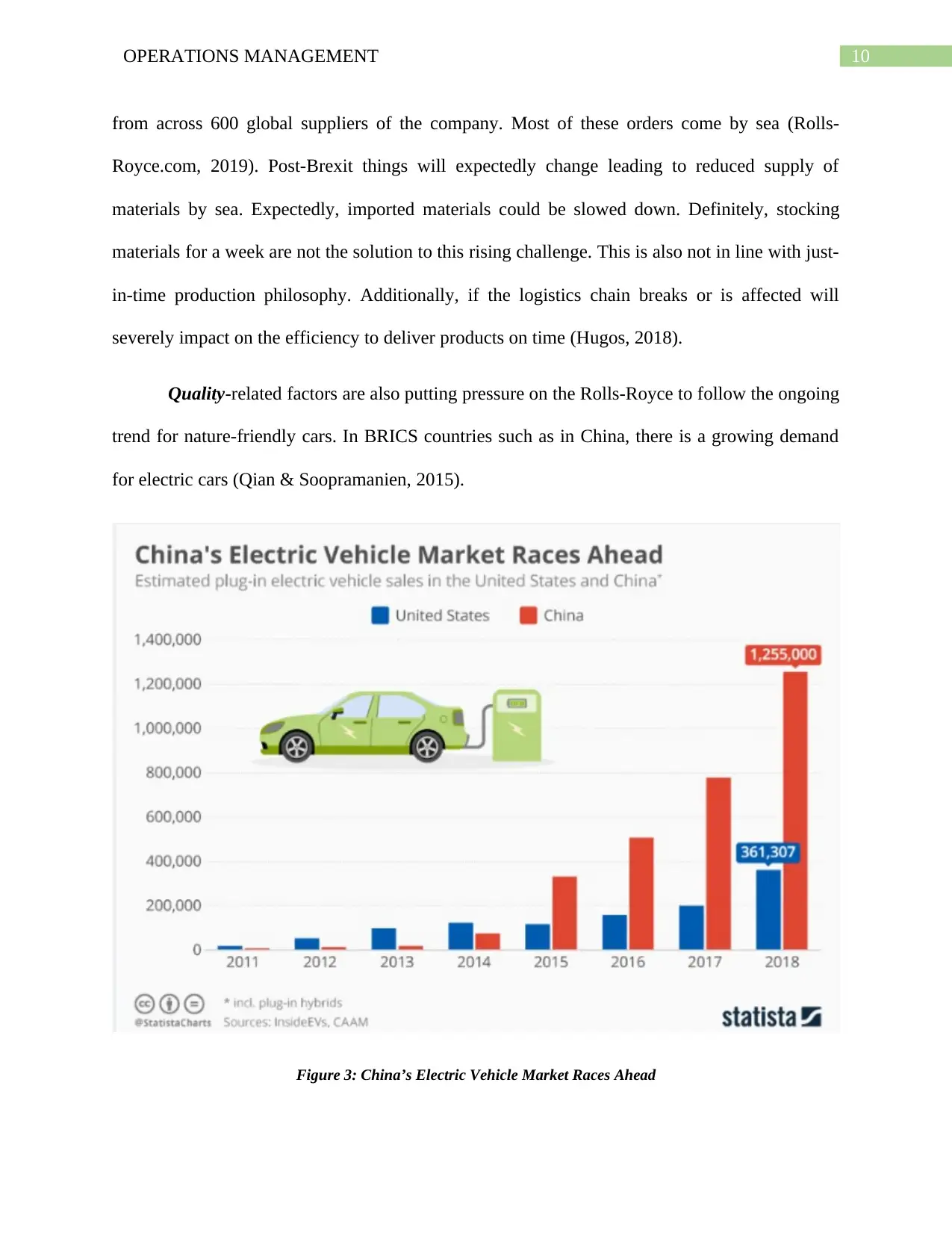
10OPERATIONS MANAGEMENT
from across 600 global suppliers of the company. Most of these orders come by sea (Rolls-
Royce.com, 2019). Post-Brexit things will expectedly change leading to reduced supply of
materials by sea. Expectedly, imported materials could be slowed down. Definitely, stocking
materials for a week are not the solution to this rising challenge. This is also not in line with just-
in-time production philosophy. Additionally, if the logistics chain breaks or is affected will
severely impact on the efficiency to deliver products on time (Hugos, 2018).
Quality-related factors are also putting pressure on the Rolls-Royce to follow the ongoing
trend for nature-friendly cars. In BRICS countries such as in China, there is a growing demand
for electric cars (Qian & Soopramanien, 2015).
Figure 3: China’s Electric Vehicle Market Races Ahead
from across 600 global suppliers of the company. Most of these orders come by sea (Rolls-
Royce.com, 2019). Post-Brexit things will expectedly change leading to reduced supply of
materials by sea. Expectedly, imported materials could be slowed down. Definitely, stocking
materials for a week are not the solution to this rising challenge. This is also not in line with just-
in-time production philosophy. Additionally, if the logistics chain breaks or is affected will
severely impact on the efficiency to deliver products on time (Hugos, 2018).
Quality-related factors are also putting pressure on the Rolls-Royce to follow the ongoing
trend for nature-friendly cars. In BRICS countries such as in China, there is a growing demand
for electric cars (Qian & Soopramanien, 2015).
Figure 3: China’s Electric Vehicle Market Races Ahead
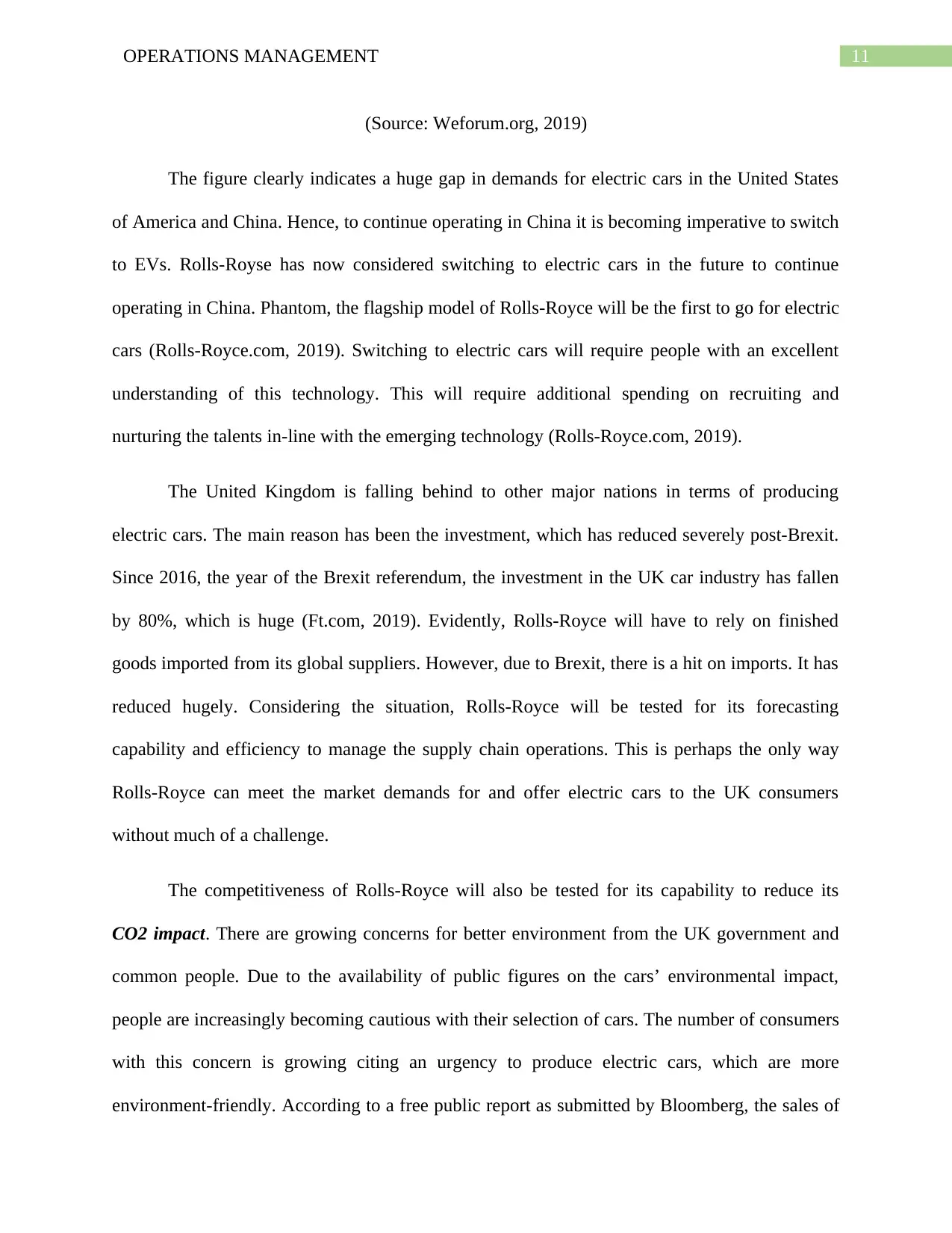
11OPERATIONS MANAGEMENT
(Source: Weforum.org, 2019)
The figure clearly indicates a huge gap in demands for electric cars in the United States
of America and China. Hence, to continue operating in China it is becoming imperative to switch
to EVs. Rolls-Royse has now considered switching to electric cars in the future to continue
operating in China. Phantom, the flagship model of Rolls-Royce will be the first to go for electric
cars (Rolls-Royce.com, 2019). Switching to electric cars will require people with an excellent
understanding of this technology. This will require additional spending on recruiting and
nurturing the talents in-line with the emerging technology (Rolls-Royce.com, 2019).
The United Kingdom is falling behind to other major nations in terms of producing
electric cars. The main reason has been the investment, which has reduced severely post-Brexit.
Since 2016, the year of the Brexit referendum, the investment in the UK car industry has fallen
by 80%, which is huge (Ft.com, 2019). Evidently, Rolls-Royce will have to rely on finished
goods imported from its global suppliers. However, due to Brexit, there is a hit on imports. It has
reduced hugely. Considering the situation, Rolls-Royce will be tested for its forecasting
capability and efficiency to manage the supply chain operations. This is perhaps the only way
Rolls-Royce can meet the market demands for and offer electric cars to the UK consumers
without much of a challenge.
The competitiveness of Rolls-Royce will also be tested for its capability to reduce its
CO2 impact. There are growing concerns for better environment from the UK government and
common people. Due to the availability of public figures on the cars’ environmental impact,
people are increasingly becoming cautious with their selection of cars. The number of consumers
with this concern is growing citing an urgency to produce electric cars, which are more
environment-friendly. According to a free public report as submitted by Bloomberg, the sales of
(Source: Weforum.org, 2019)
The figure clearly indicates a huge gap in demands for electric cars in the United States
of America and China. Hence, to continue operating in China it is becoming imperative to switch
to EVs. Rolls-Royse has now considered switching to electric cars in the future to continue
operating in China. Phantom, the flagship model of Rolls-Royce will be the first to go for electric
cars (Rolls-Royce.com, 2019). Switching to electric cars will require people with an excellent
understanding of this technology. This will require additional spending on recruiting and
nurturing the talents in-line with the emerging technology (Rolls-Royce.com, 2019).
The United Kingdom is falling behind to other major nations in terms of producing
electric cars. The main reason has been the investment, which has reduced severely post-Brexit.
Since 2016, the year of the Brexit referendum, the investment in the UK car industry has fallen
by 80%, which is huge (Ft.com, 2019). Evidently, Rolls-Royce will have to rely on finished
goods imported from its global suppliers. However, due to Brexit, there is a hit on imports. It has
reduced hugely. Considering the situation, Rolls-Royce will be tested for its forecasting
capability and efficiency to manage the supply chain operations. This is perhaps the only way
Rolls-Royce can meet the market demands for and offer electric cars to the UK consumers
without much of a challenge.
The competitiveness of Rolls-Royce will also be tested for its capability to reduce its
CO2 impact. There are growing concerns for better environment from the UK government and
common people. Due to the availability of public figures on the cars’ environmental impact,
people are increasingly becoming cautious with their selection of cars. The number of consumers
with this concern is growing citing an urgency to produce electric cars, which are more
environment-friendly. According to a free public report as submitted by Bloomberg, the sales of
⊘ This is a preview!⊘
Do you want full access?
Subscribe today to unlock all pages.

Trusted by 1+ million students worldwide
1 out of 28
Related Documents
Your All-in-One AI-Powered Toolkit for Academic Success.
+13062052269
info@desklib.com
Available 24*7 on WhatsApp / Email
![[object Object]](/_next/static/media/star-bottom.7253800d.svg)
Unlock your academic potential
Copyright © 2020–2026 A2Z Services. All Rights Reserved. Developed and managed by ZUCOL.


